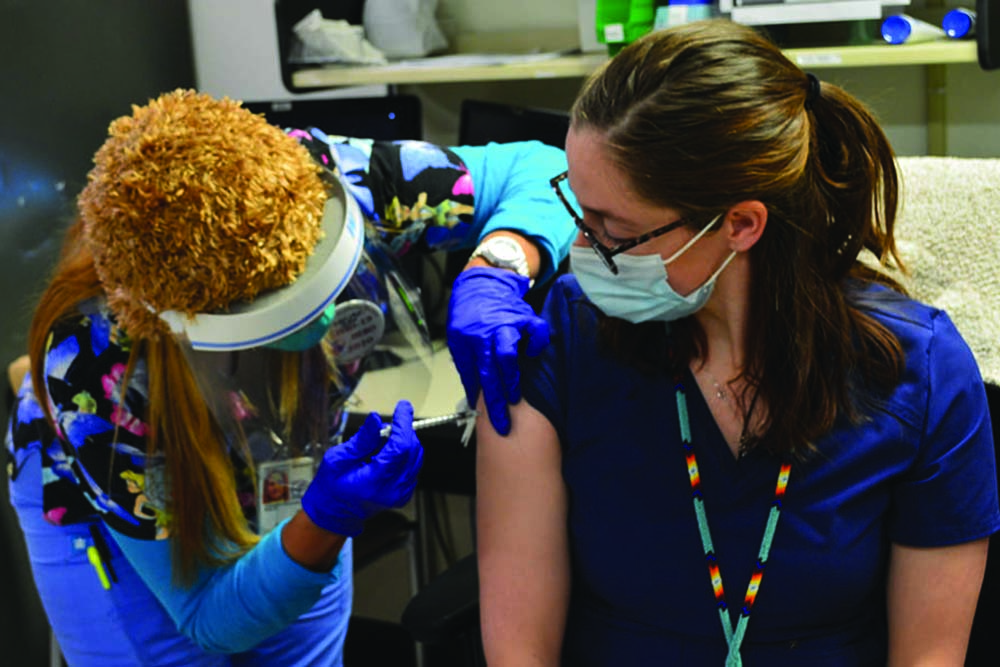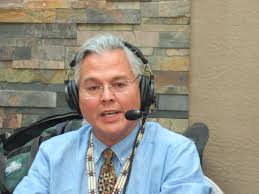
- Details
- By Aaron A. Payment
OPINION. Most treaties include the sweeping language to provide ~ “health, education and social welfare” into perpetuity. The 1855 Treaty with the Makah specifically referenced the obligation to vaccinate in the following language, “shall furnish medicine and advice to the sick, and shall vaccinate them…”
I write this to encourage all American Indian and Alaska Native (AIAN) people including my fellow tribal citizens to prioritize being vaccinated as we are easily the most vulnerable population of Americans as a high-risk category. The 2018 U.S. Commission on Civil Rights Broken Promises Report documents the life expectancy for AIANs is 5.5 years less than the national average. We die at higher rates than those of other Americans from chronic liver disease and cirrhosis, heart disease, chronic lower respiratory and other diseases. AIAN as a group suffer from the highest rate of diabetes in the nation with approximately 16 percent of our people diagnosed with diabetes - a rate roughly double that of the national average.
Data on the number of AIAN cases and deaths related to the Covid-19 virus is insufficient, incomplete and unacceptable as it is a subset of the universe of cases limited to the IHS and tribes’ health service delivery systems which is only a fraction of the population of AIAN. Further, counties are the unit of measurement for public health data collection at the direction of their respective states which often relegates American Indians as “other” and does not enumerate tribal specific cases

Further, approximately half to two thirds of our respective AIAN populations who live outside of our Purchase and Referred Services Areas (formerly Contract Health) go without federal funding and for which we simply do not have data on their experience through the Covid-19 pandemic. Without the benefit of health care afforded through IHS and tribes, I suspect the rate of contagion and death for (what I call) our at-large members is likely much higher due to lack of health care access. This supports Affordable Care Act expansion for AIAN under a 51st state concept rather than subordinated through states as sovereigns. Better yet, full recognition of the treaty obligation for health necessitates Indian Health portability no less than defense health care portability.
What we do know is that according to the Indian Health Service (IHS), some regions have experienced a 7-day rolling average positivity rate for Covid-19 of 19.5 percent (Tucson), 18.0 percent (Phoenix), 17.4 percent (Navajo), and 17.3 percent (Oklahoma City). Further, Centers for Disease Control and Prevention (CDC) data from14 states show AIAN have died at a rate of nearly two times that of the rate for white people in a sample from these same states. So, while our data is incomplete, available data we do have demonstrates that the only population of Americans with a federal right to health care and who experience the greatest risk as documented by the Broken Promises Report, have suffered the most—disproportionately—in terms of cases and deaths related to Covid-19.
American Indian & Alaska Native Survivors
We are survivors of the manifest destiny AIAN holocaust which included removal, boarding school assimilation mills, forced concentration on reservations devoid natural resources, and yes - the introduction of smallpox in infected blankets. Today, tribes are self-determined with scientists that rival that of any nation. Still, we have our oral tradition and stories that remind us of diseases like smallpox spread inadvertently or purposefully by the federal government. Couple this the Tuskegee syphilis experiments on African American men and sterilization of AIAN women during the federal Indian Termination Era as late as the early 1970s and it is no wonder some of our people are skeptical about being vaccinated.
Today, we have our own scientists, National Native Advisories for federal policy, and reputable national Native organizations, such as the National Congress of American Indians and National Indian Health Board, that monitor the Covid-19 pandemic closely and fight to advocate that we receive an equitable share of the various vaccines being delivered. Careful attention has been paid to ensuring AIANs were part of testing and are assured a level of delivery of vaccine doses along with the national deployment of the vaccine.
Vaccines Are On the Way
As of this writing, the vaccine created by Pfizer for Covid-19 has been approved for deployment. The National Indian Health Service will receive more than 22,400 doses this week. Tribes have been given guidance to vaccinate their front-line medical staff first as it is anticipated with the holidays, another uptick of cases is expected. Even then, tribes have to prioritize and triage vaccinations as only 66 percent of the need can be met in the first round. The deployment is a logistical challenge with delivery by US Coast Guard helicopter to a few sites and tribes having to drive with equipment on board to keep the vaccine at below 90F. Given Murphy’s Law, my Tribe was urged to use up the first shipment within five days to ensure efficacy. Those receiving the first round will also get a second round to make the vaccine complete. The next wave of vaccines will come through the provider Moderna once the FDA issues its approval and clears all federal approvals.This is expected to be quick and will then provide another 46,000 doses to tribes through IHS and self-governance tribal health clinics5. Thus, tribal Elders and other priorities for vaccination will be possible. Even more vaccines are slated to be approved thereafter and additional quantities of the above providers will become available. Please realize that as a United States citizen, you do not have to wait to be vaccinated through the IHS or tribal health delivery system. If you have an opportunity to be vaccinated earlier, by all means do so.
AIAN - The Most Vulnerable: The Least Funded
According to the National Congress of American Indians (NCAI) and IHS Budget Formulation Work Group Data, IHS lags behind national health spending per capita at less than 50 percent and about one-third of that is spent for National Defense health administration (respectively). Again, AIAN are the only group with a federally and constitutionally obligated right to health care (NCAI, 2020). Further, while budget formulation through National Native organizations call for between $20 billion to $48 billion annually for IHS, the 2019 budget was just $5.8 billion. The NCAI, NIHB, and IHS budget formulation work group proposed budget for FY 2021 is just over $9 Billion. Early indications from the Biden-Harris Administration suggest a significant increase in the Presidential budget request approximating full funding. This is important because while the Congress appropriates, tribes have never enjoyed a Presidential Administration proposing full funding for IHS. Further, advocates are optimistic about support from the Biden-Harris Administration to move our IHS funding from discretionary to mandatory and to support advance appropriations in order to avoid the adverse impacts of sequestration and government shutdowns.
Again, we possess the highest risk yet, have the least access to health care despite being the only group of Americans with a constitutional right to healthcare. During times of acute health care needs that this pandemic revealed, it is important to recall why AIANs have a federal right to health care. Treaties between the United States and tribal nations provide the original legal foundation for the federal government’s obligation to provide health care for Native Americans. According the National Indian Health Service:
The trust relationship establishes a responsibility for a variety of services and benefits to Indian people, including health care. This relationship has been defined in case law and statute as a political relationship . . . Treaties between the United States [g]overnment and Indian [t]ribes frequently call for the provision of medical services, the services of physicians, or the provision of hospitals for the care of Indian people.
My Anishinabe Biimaadziwin teachings hold the ethos, “take what you need and leave the rest” which applies to a conservationist lifestyle but also more broadly as a philosophy to use our intellect to adapt to survive. As a People, American Indians / Alaska Natives have a unique experience with infectious diseases, a resulting level of historical and intergenerational trauma and a level of skepticism. The alternative of death or lasting impacts of contraction of the Covid-19 virus suggests we carefully consider and weigh the value of being vaccinated. I plan to be vaccinated as soon as our front-line health delivery staff, our elders and others who are higher risk receive their dose.
In the meantime, I will remain diligent with wearing a mask, social distancing, and just not going into public except when absolutely necessary.
Dr. Aaron Payment is chairperson of the Sault Ste. Marie Tribe of Chippewa Indians, based in Sault Ste. Marie, Mich. The Tribe is the most populated American Indian tribe east of the Mississippi River. He also serves as the first vice president of the National Congress of American Indians.
Help us defend tribal sovereignty.
At Native News Online, our mission is rooted in telling the stories that strengthen sovereignty and uplift Indigenous voices — not just at year’s end, but every single day.
Because of your generosity last year, we were able to keep our reporters on the ground in tribal communities, at national gatherings and in the halls of Congress — covering the issues that matter most to Indian Country: sovereignty, culture, education, health and economic opportunity.
That support sustained us through a tough year in 2025. Now, as we look to the year ahead, we need your help right now to ensure warrior journalism remains strong — reporting that defends tribal sovereignty, amplifies Native truth, and holds power accountable.
 The stakes couldn't be higher. Your support keeps Native voices heard, Native stories told and Native sovereignty defended.
The stakes couldn't be higher. Your support keeps Native voices heard, Native stories told and Native sovereignty defended.
Stand with Warrior Journalism today.
Levi Rickert (Potawatomi), Editor & Publisher
